In the realm of nutrition, protein stands as a fundamental building block for maintaining optimal health and vitality. While many associate protein with animal products, the realm of vegetarianism offers a diverse array of protein sources that are both nutritious and delicious. At WellHealthOrganic.com, we’re committed to promoting health and wellness through sustainable, plant-based nutrition. In this comprehensive guide, we’ll delve into the world of vegetarian protein sources, exploring their benefits, nutritional profiles, and delicious ways to incorporate them into your diet.
1. Plant-Powered Protein: Nourishing Your Body Naturally
- Legumes: Legumes such as lentils, chickpeas, black beans, and kidney beans are rich sources of protein, fiber, and essential nutrients. They’re versatile ingredients that can be used in soups, salads, stews, and curries, making them a staple in vegetarian diets.
- Quinoa: Quinoa is a complete protein, meaning it contains all nine essential amino acids that the body cannot produce on its own. This ancient grain is gluten-free, high in fiber, and packed with vitamins and minerals, making it an excellent choice for vegetarian meals.
- Tofu and Tempeh: Derived from soybeans, tofu and tempeh are plant-based protein powerhouses. Tofu, made from soybean curds, is incredibly versatile and can be used in stir-fries, scrambles, and smoothies. Tempeh, a fermented soybean product, has a nutty flavor and firm texture, making it a great meat substitute in sandwiches, tacos, and salads.
- Nuts and Seeds: Nuts and seeds such as almonds, walnuts, chia seeds, and hemp seeds are rich in protein, healthy fats, and antioxidants. They make convenient and nutritious snacks and can also be incorporated into recipes like granola, trail mix, and homemade energy bars.
2. Benefits of Vegetarian Protein: Nourish Your Body, Nourish the Planet
- Heart Health: Plant-based proteins are often lower in saturated fat and cholesterol compared to animal proteins, making them heart-healthy choices that can help reduce the risk of cardiovascular disease.
- Weight Management: Incorporating vegetarian protein sources into your diet can aid in weight management by promoting satiety and reducing overall calorie intake. Plant-based proteins are often high in fiber, which helps you feel fuller for longer and supports healthy digestion.
- Environmental Sustainability: Choosing vegetarian protein sources is not only beneficial for your health but also for the health of the planet. Plant-based diets have a lower carbon footprint and require fewer natural resources such as water and land compared to animal-based diets, making them a more sustainable choice for the environment.
3. Delicious Ways to Incorporate Vegetarian Protein into Your Diet
- Protein-Packed Smoothies: Blend up a nutritious smoothie using ingredients like tofu, spinach, almond milk, and a scoop of plant-based protein powder for a quick and satisfying breakfast or post-workout snack.
- Hearty Bean Chili: Whip up a comforting pot of bean chili using a variety of beans such as black beans, kidney beans, and pinto beans. Add in plenty of veggies, herbs, and spices for a flavorful and nutritious meal that’s perfect for chilly evenings.
- Quinoa Salad: Create a vibrant quinoa salad loaded with colorful vegetables, fresh herbs, and a tangy vinaigrette dressing. Top it off with toasted nuts or seeds for added crunch and protein.
- Tofu Stir-Fry: Stir-fry tofu with an assortment of vegetables and your favorite sauce for a quick and easy weeknight dinner. Serve it over brown rice or quinoa for a satisfying meal that’s packed with plant-based protein.
How much protein can the Human need and what requirements?
Protein is a building block in the human body and plays a typical role in the repair of tissues & muscles.“It’s essential to make muscles and tendons and skin tissues, and it helps your body produce antibodies to fight infections and improve the healthy adults should get about 0.36 grams of protein per pound of their body weight each day. That equals about 54 grams for an adult weighing 150 pounds. As per common perception, globally animal protein is consumed globally. However, in recent years it has seen disadvantages in many forms. This is why awareness related to vegetable protein has been multi-folded. In countries like India consuming vegetable protein has gone on a large scale.
High-protein vegetables and seeds can provide a good source of protein.
High-Protein Vegan Diet to focus on the foods
- Nuts: These are the best food for maintaining good health and the amount of protein for every 100 grams, but there are also a lot of calories from fat. They are a great snack food to take around, or you can mix in nut butter like peanut butter with something like a smoothie.
- Legumes: The most balanced vegan protein source in terms of protein and calorie density. Dry beans are far cheaper and anyone can purchase them easily, and most vegans consider them to be a must-have. Their high fiber and water content causes them to rank not well on the lists above. Soy-based products, such as tempeh, tofu, and soy milk, are the best bean products that provide protein.
- Beans: Each kind of bean can provide 6 to 9 grams of protein and 6 to 8 grams of fiber to help you feel full in just half a cup. Beans may also support good gut flora and reduce cholesterol.
- Grains: You probably think of grains as primarily carbohydrates, but they also pack a protein punch. For example, for your morning meals, half a cup of oats offers five grams of protein, while a quarter cup of fresh barley or grain adds five to six grams. Teff, millet, amaranth, and other ancient grains are also great options to mix up your meals.
- Green peas: Green peas are like many people to many other healthy nutrients like fiber, vitamin K, and vitamin A, green peas also contain carbohydrates and protein while they get a bad rapping, peas are a fantastic source of protein: Cooked peas contain eight grams per cup.
- Plant-based eats: Plants can be provided Dairy milk and pea milk, a substitute for milk, contains almost as much protein as cow’s milk. Find varieties that are such as casually flavored or without sugar.
- Nutritional yeast: The secret ingredient in many vegan “cheese” sauces, nutritional yeast is a great source of protein and B vitamins. One tablespoon sprinkled on top of your meal adds two grams of protein.
- Vegetables: They’re not the most abundant sources of protein, but if you’re eating a diet heavy on vegetables, you’ll get a decent amount of protein from them. For example, a cup of cooked Brussels sprouts contributes 4 grams of protein to your meal. these ingredients can be used Five grams make up a cup of sweet yellow maize Low in calories but high in protein per calorie are leafy greens such as bok choy, spinach, and watercress.
- Meat substitutes: For any meat lovers, faux meat products can ease the switch to a plant-based diet, but not all of them are good for you. Choose items with few ingredients, lots of protein, and a healthy amount of sodium and saturated fats.
- Eggs or egg whites: The egg is the best part of the protein and they are the cheapest cost they can purchase easily and nutritious source of proteins. Each egg provides 6 to 8 grams. If you eat white eggs, you are not getting as many calories, but you won’t get the B vitamins, omega-3 fatty acids, and vitamin D that are contained in the yolk.
- Dairy products: Dairy Products are the best source of the product. These are the making in many things like butter, milk, cheese, and curd, these are excellent sources of protein and calcium. To get the most protein in dairy products can be manipulated by plain Greek yogurt. Every serving of these contains dairy products at least 13 grams of protein, and they can be attired up for a hearty breakfast or snack by including fruit, nuts, or granola.
- Seed: Like nuts, seeds are a great source of protein and unsaturated fats. These are the Select pumpkin seeds, which have 7 grams of protein per ounce, and sunflower seeds, which have 8 grams each ounce, as a snack. You can also sprinkle hemp seeds, which have about 10 grams per ounce, on your morning oatmeal or toast.
- Peanuts: Peanuts have 25.8 grams of protein per 100 grams. Peanuts are the best foods for vegan bodybuilders and these do not technically work Peanut butter can be performed easier to add to a variety of other foods, and peanuts themselves taste delicious.
- Almonds: Almonds contain 21.1 grams of protein per 100 grams, and almond milk also contains quite a bit. The biggest downside of using nuts as a protein source is that they contain a lot of calories and omega-6 fats. They should generally limit how much eat almonds and the ratio can eat on the omega 3 to 6 fat ratio of nuts for more data.
- Flaxseed: Rounding out our elite 8 is flaxseed with 18.3 grams of protein per 100 grams. Similar to seeds like flax, flax is one of the best vegan sources of omega-3 fats and an excellent source of many vitamins and minerals. The majority of people should eat as much of this tasty food as they can. Add it to salads, smoothies, oatmeal, and even baked items as a “vegan egg.”
- Pumpkin Seeds: Pumpkin seeds have 18.5 grams of protein per 100 grams and the seeds are beneficial in health these can be not only good sources of protein but minerals like magnesium, zinc, and copper as well as are good for health. Similar to nuts, the omega 3 to 6 fat ratio of seeds (avoid sunflower seeds in particular) isn’t always great.
These are Other nutritional considerations used for vegetarians and vegans:
- Vitamin B12.
- Calcium.
- Iron.
- Zinc.
- Vitamin D.
- Omega-3 fatty acids.
Chickpea nutrition facts
Chickpeas are rich in fiber and protein. They contain several key vitamins and minerals. Importance nutrition can be used and provided the benefits of chickpeas may include and get helping reduce the risk of type 2 diabetes and supporting brain and nervous system function.
- 14.5g protein
- 269 calories
- 4.25g fat
- 44.9g carbohydrates
- 12.5g fiber
Peanut butter nutrition facts
Peanut butter is high in fat and calories. Just 2 tablespoons deliver a quarter of your recommended daily intake of fat, some of it saturated. Moreover, peanuts are one of the eight most common food allergens in the United States, affecting 1.4% of the population (or roughly 4.6 million people).
- 7g protein
- 190 calories
- 16g fat
- 7g carbohydrates
- 2g fiber
Lentils nutrition facts
Divide many parts of protein sources like red lentils, orange, red, yellow, and black lentils are among the other lentil types. Given their powerful nutritional profile, lengthy shelf life, and ease of preparation, lentils are a wise and healthful part of any diet.
- 17.9g protein
- 230 calories
- 0.75g fat
- 39.8g carbohydrates
- 15.6g fiber
Edamame nutrition facts
In addition, research shows that consuming soy protein might help to lower your cholesterol and even reduce the risk of certain cancers. Green soybeans called edamame are commonly served in their beans with an equal amount of sea salt. Additionally to being an excellent source of plant-based protein, these beans are also a good source of fiber, important vitamins, and minerals.
- 18.4g protein
- 188 calories
- 8g fat
- 13.8g carbohydrates
- 8g fiber
Tofu nutrition facts
Also known as bean curd, tofu is made from soybeans and provides a wide range of health benefits. When you include tofu in your diet, it can provide a quality source of protein, benefit your heart, and support strong bones. The list of vegan protein sources wouldn’t be complete without tofu. Plus, it’s time to end the stigma that tofu is bland.
- 21.8g protein
- 181 calories
- 11g fat
- 3.5g carbohydrates
- 2.9g fiber
Oats nutrition facts
Oats are a good source of many vitamins, minerals, and unique plant compounds. These are famous in grain and also offer several potential health benefits, including reduced cholesterol improved insulin sensitivity, and tasty dishes with milk.
- 6g protein
- 166 calories
- 3.56g fat
- 28.1g carbohydrates
- 4g fiber
Walnuts nutrition facts
In these are addition to being nutritious and a filling and tasty food, walnuts can be added to a broad range of recipes, including savory and sweet treats. Walnuts are an excellent source of polyunsaturated fat—a healthy fat that can boost heart health and provide other benefits.
- 220 calories
- 22g fat
- 5g carbohydrates
- 2g fiber
- 5g protein
Almonds nutrition facts
Almonds are also highly versatile. Almonds are a low-fat, high-nutrient food that can be eaten either raw or cooked. They are also lightweight. You can buy raw, roasted, salted, or without-salt almonds. The almond can be turned into almond butter, almond milk, or ground to make an almond meal.
- 6g protein
- 170 calories
- 15g fat
- 6g carbohydrates
- 4g fiber
Flax seeds nutrition facts
Flaxseed—also commonly referred to as flax seed or linseed—can be a nutritious addition to your diet. The little brown or golden seeds are high in fatty acids and fiber, both of which are heart-healthy. They can be eaten whole or used to make flaxseed oil, extracts, flour, and food products like salad dressing. Flaxseed has been famous for thousands of years in the whole world.
- 5g protein
- 160 calories
- 9g carbohydrates
- 12g fat
- 8g fiber
Soybeans nutrition facts
Soybeans are the best nutrition facts Because they are high in protein and healthy, soybeans have an extensive number of nutritional uses. People can eat them, drink them in milk alternatives, and take them in the form of supplements.
- 31.3g protein
- 401 calories
- 14.4g carbohydrates
- 27.5g fat
- 10.4g fiber
Peas nutrition facts
Green peas are a popular vegetable. Also, they are equally full of nutrients and have quite a bit of antioxidants and fiber.
- 70 calories
- 12g carbohydrates
- 0g fat
- 5g fiber
- 4g protein
Common Vegetarian Protein Sources In Indian Households
1. Legumes: Beans, Lentils, and Peas
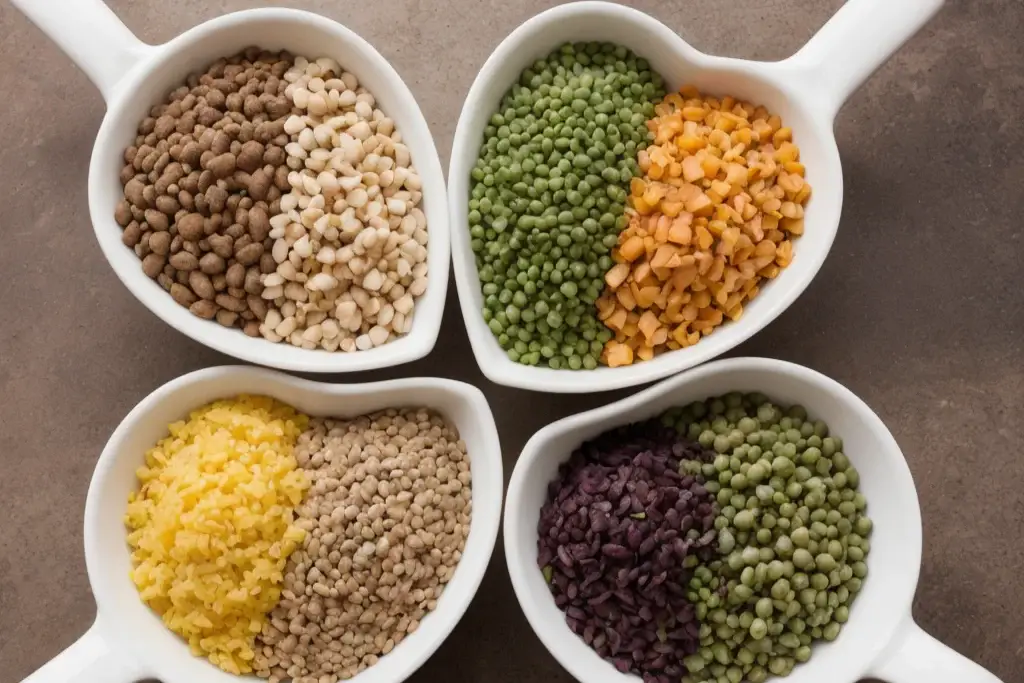
Legumes are a powerhouse of protein, fiber, and various nutrients.
Research published in the Journal of the Academy of Nutrition and Dietetics highlights legumes as not only a rich source of protein but also beneficial for our heart health and diabetes prevention.
Nutritional Profile of Common Indian Legumes: Vegetarian Protein Sources
| Item | Protein Content (per 100g) | Calories (per 100g) | Fiber Content (per 100g) | Important Micronutrient |
|---|---|---|---|---|
| Kidney Beans | 8.9g | 127 | 6.4g | Folate |
| Black Gram | 25g | 341 | 4.8g | Iron |
| Green Peas | 5g | 81 | 5.1g | Vitamin C |
| Chickpeas | 19g | 364 | 17g | Iron |
| Mung Beans | 24g | 347 | 16.3g | Folate |
| Red Lentils | 26g | 116 | 7.9g | Folate |
| Soybeans | 36g | 446 | 9.3g | Iron |
2. Quinoa: The Complete Protein
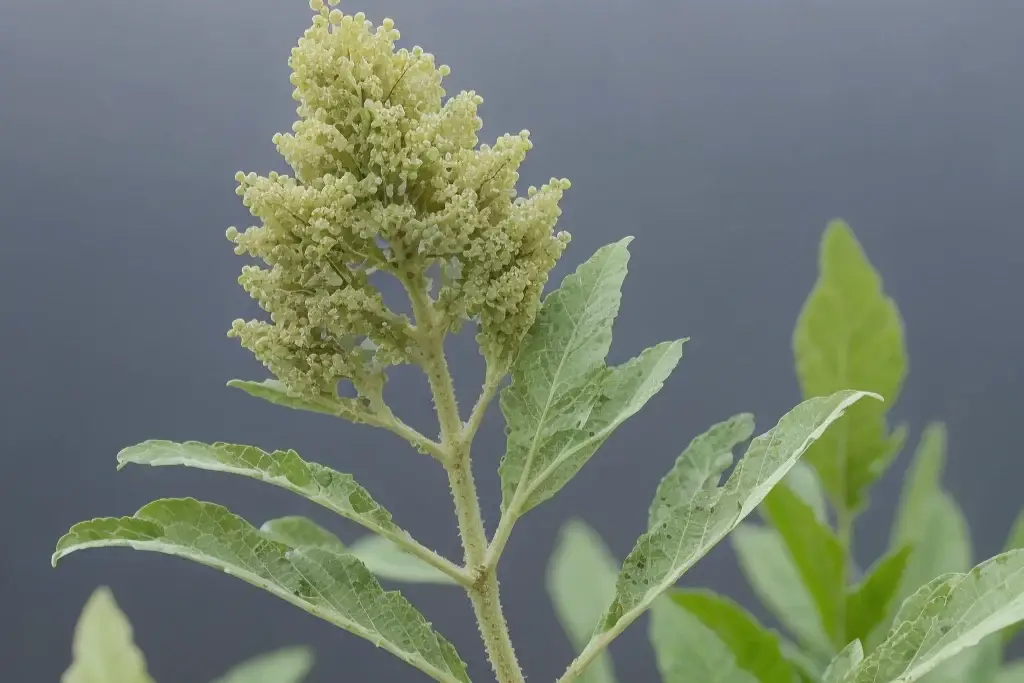
Unlike many plant proteins, quinoa seeds are considered a complete protein, containing all nine essential amino acids.
A study in the Journal of Current Opinion in Food Science points out quinoa’s protein quality and its role in improving the nutritional content of a vegetarian diet.
Nutritional Content of Quinoa: Vegetarian Protein Sources
| Nutrient | Amount per 100g |
|---|---|
| Protein | 4.4g |
| Calories | 120 |
| Fiber | 2.8g |
| Magnesium | 64mg |
| Iron | 1.5mg |
| Calcium | 17 mg |
3. Nuts and Seeds: Compact Nutrient Dynamos
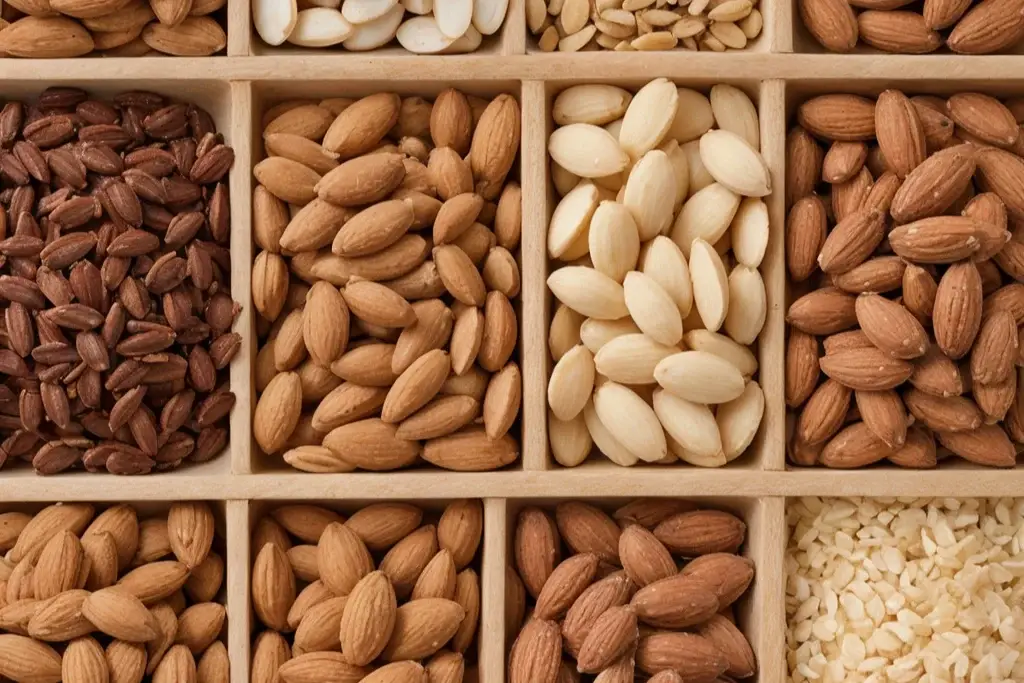
Nuts and seeds are not only protein-rich but also provide healthy fats, vitamins, and minerals. Almonds, for example, offer around 6 grams of protein per ounce.
The Americal diabetes association notes that incorporating nuts into your diet can lower the risk of cardiovascular disease.
Nutritional and Health Benefits of Common Nuts and Seeds: Vegetarian Protein Sources
| Nut/Seed Type | Protein Content per 100g | Health Benefits |
|---|---|---|
| Almonds | 21.4g | High in Vitamin E, reduces heart disease risk |
| Walnuts | 14.6g | Rich in Omega-3, supports brain health |
| Pistachios | 20.5g | Lowers LDL cholesterol, good for heart health |
| Cashews | 17.4g | Magnesium-rich supports heart and liver health |
| Flaxseeds | 18g | High in Omega-3 fatty acids, anti-inflammatory |
| Pumpkin Seeds | 30g | Magnesium-rich, supports heart and liver health |
| Chia Seeds | 17g | High in fiber, promotes weight management |
4. Soy Products: Tofu, Tempeh, and Edamame
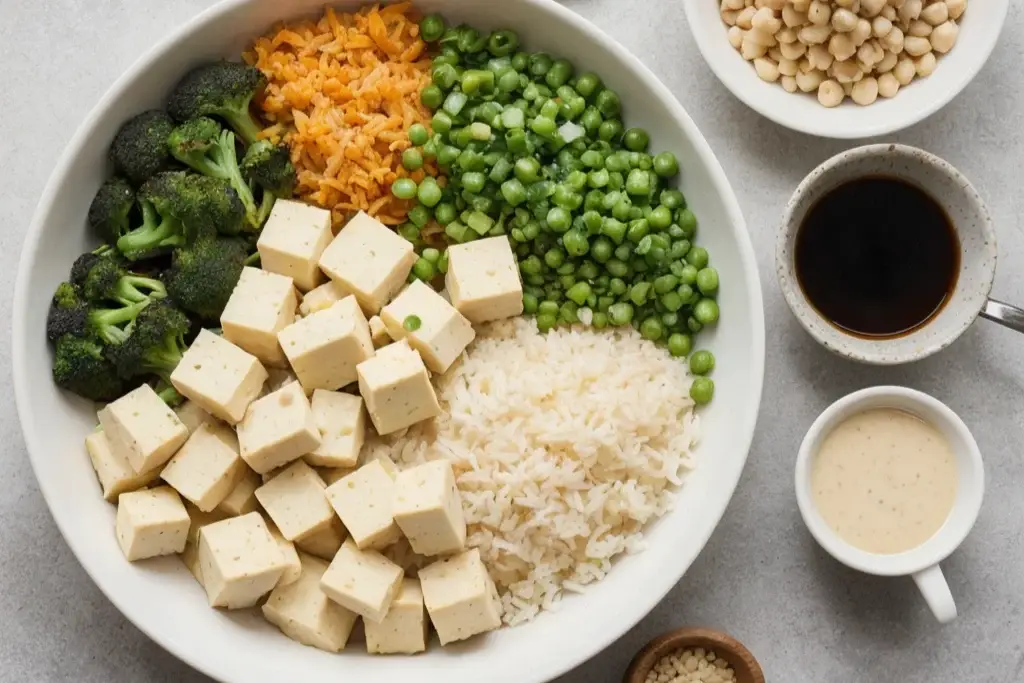
Soy products are versatile, high in protein, and can be great meat substitutes. Tofu, for instance, packs about 10 grams of protein per half-cup serving.
A report published in the American Journal of Clinical Nutrition supports soy’s role in a healthy vegetarian diet, emphasizing its nutritional benefits and versatility.
Wellhealthorganic Vegetarian Protein Sources:
Nutritional Profile and Benefits of Common Soy Products: Vegetarian Protein Sources
| Soy Product | Protein Content per 100g | Calories per 100g | Key Nutrients | Dietary Benefits |
|---|---|---|---|---|
| Tofu | 17g | 144 | High in calcium and iron | Supports bone health, good for heart health |
| Tempeh | 20g | 192 | Rich in protein and fiber | Aids digestive health, beneficial for muscle growth |
| Edamame | 12g | 121 | High in fiber, vitamin K, folate | Lowers cholesterol, may help in blood pressure management |
Nutritional Benefits of Nuts and Seeds
Nuts and seeds serve as an excellent vegetarian protein source and offer a plethora of health benefits. Many varieties like almonds, walnuts, pistachios, and pumpkin seeds are nutrient-dense options.
Some of the benefits include:
- Rich in healthy fats, protein, fiber, and essential micronutrients like vitamins and minerals.
- Helps lower cholesterol and the risk of heart disease.
- Aids in weight management, because they help you feel full, reducing the urge for unhealthy snacking.
- Lowers inflammation, which can lead to the prevention of various chronic diseases.
Including nuts and seeds as part of a healthy diet is an excellent way to obtain valuable nutrients, plant-based proteins, and fibers.
Pro Tip: Try tossing nuts and seeds into your salads, smoothies or enjoy them in your snacks for a healthy and nutritious boost.
How Nuts and Seeds Contribute to a Balanced Diet
Nuts and seeds are a great source of protein for vegetarians to incorporate into their diets. They are also rich in healthy fats, vitamins, and minerals.
Some of the best nuts and seeds for protein include almonds, peanuts, pumpkin seeds, chia seeds, and flax seeds.
Almonds are a particularly good source of protein, with 6 grams of protein per ounce. Other nuts and seeds, such as pumpkin seeds and chia seeds, are also high in protein, with 5 grams and 4 grams of protein per ounce, respectively.
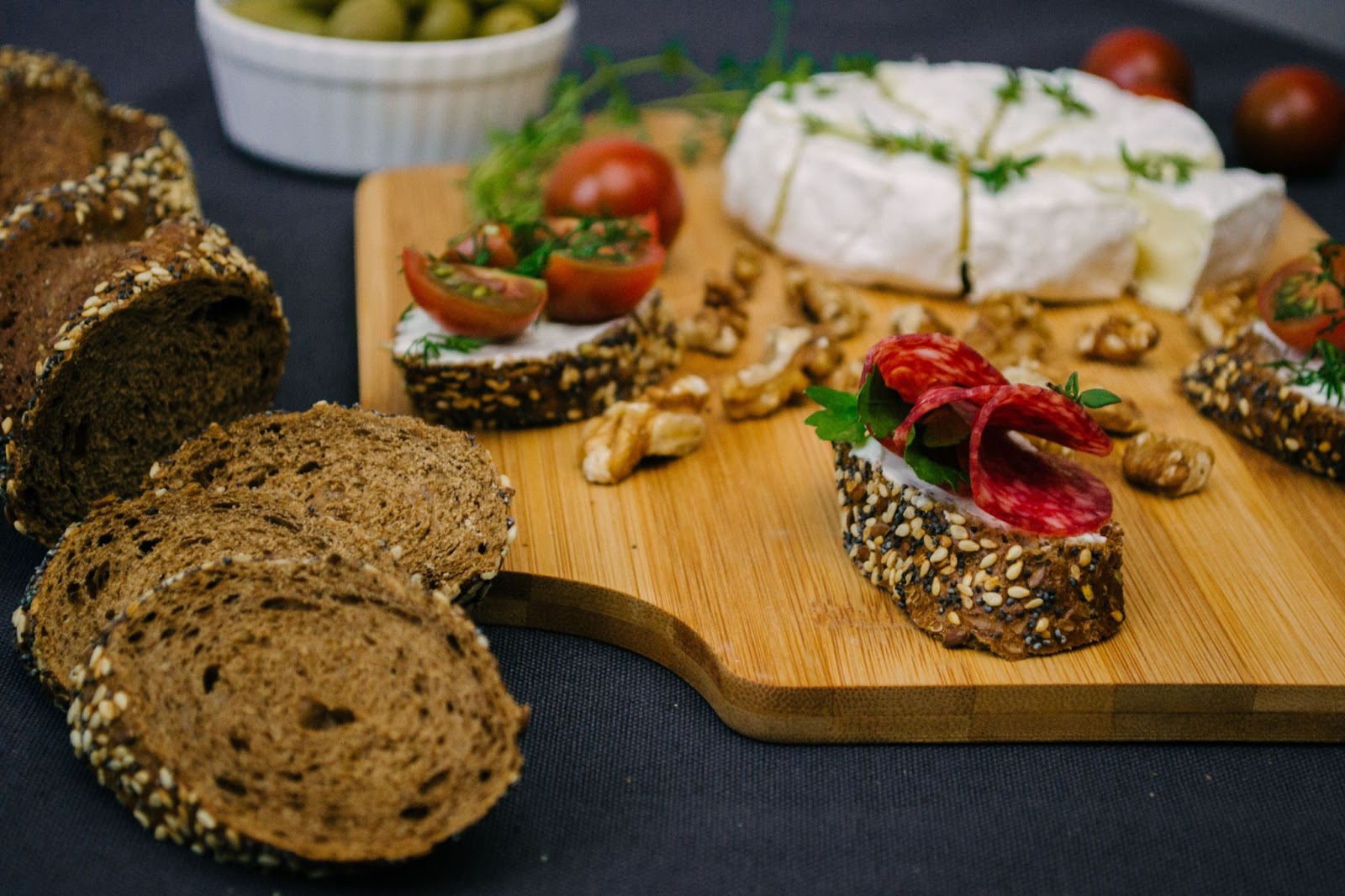
In addition to protein, nuts and seeds are also rich in other important nutrients, such as fiber, healthy fats, vitamin E, magnesium, and zinc.
Incorporating nuts and seeds into your diet can help you maintain a balanced and healthy diet, particularly if you are vegetarian or vegan. They are easy to snack on or add to meals, and can provide a tasty and healthy source of protein.
Comparing Nuts and Seeds to Other Protein Sources
Nuts and seeds are a great source of protein for vegetarians, but how do they compare to other protein sources? Let’s take a closer look and see.
Almonds – A 1 oz serving of almonds contains 6 grams of protein, making them a good plant-based protein option.
Chia Seeds – These tiny seeds pack a protein punch, with 4 grams of protein in a 2 tablespoon serving.
Quinoa – This seed is a complete protein, meaning it contains all nine essential amino acids. A 1 cup serving has 8 grams of protein.
Lentils – Lentils are also a complete protein, with 18 grams of protein per cooked cup.
Chicken Breast – A 3 oz serving of chicken breast has about 24 grams of protein, making it a higher protein option than most nuts and seeds.
Although nuts and seeds cannot compete with animal-based protein sources like chicken, they are a great source of plant-based protein that can help vegetarians meet their protein needs.
https://wellhealthorganic.com/vegetarian-protein-sources
Nuts and seeds are an excellent source of plant-based protein, making them ideal for vegetarians and vegans. High in fibre, healthy fats and essential vitamins and minerals, they can make a great addition to your diet.
In this article, we will look at the top nuts and seeds for protein, how to incorporate them into your meals and other health benefits they provide.
Almonds
Almonds are an excellent source of protein for vegetarians and non-vegetarians alike, and they provide a range of other essential nutrients.
Here are some top nuts and seeds for protein, apart from almonds:
Pistachios: Pistachios are high in protein and can help to reduce inflammation and improve heart health.
Chia Seeds: Chia seeds are high in protein and fiber and can help regulate blood sugar.
Pumpkin Seeds: Pumpkin seeds are an excellent source of protein and healthy fats and can help boost immunity.
Hemp Seeds: Hemp seeds are rich in protein, omega-3 fatty acids, and fiber, making them a superfood for vegetarians and non-vegetarians alike.
Walnuts: Walnuts contain high levels of protein and healthy fats and have been linked to improved brain function and heart health.
Including these nuts and seeds in your diet can help you meet your protein requirements and enjoy a variety of flavors and textures in your meals.
Sunflower Seeds
Sunflower seeds are one of the top nuts and seeds for protein, making them an excellent vegetarian protein source.
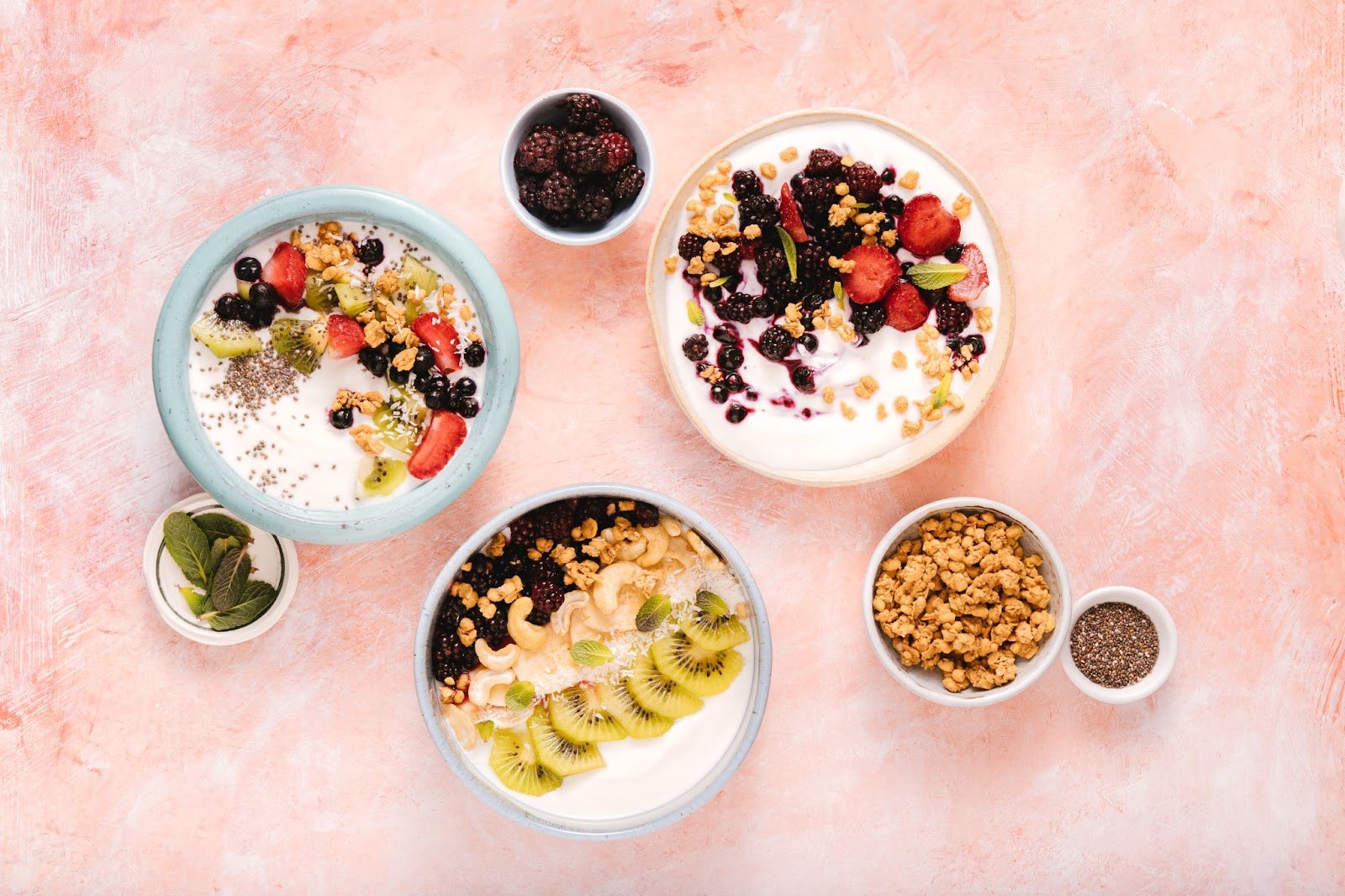
Here are some facts about sunflower seeds:
- One quarter-cup serving of dry-roasted sunflower seeds contains about 6 grams of protein.
- They are also rich in healthy fats, fiber, and several essential vitamins and minerals.
- Sunflower seeds can be eaten as a snack, added to salads or soups, or used to make sunflower butter.
Other top nuts and seeds for protein include almonds, peanuts, pumpkin seeds, chia seeds, and hemp seeds, making them great options for vegetarians and vegans looking to add more protein to their diet. These nuts and seeds are also versatile and can be added to a variety of dishes or eaten as a snack for a quick protein boost.
Pro tip: To maximize the nutritional value of nuts and seeds, consider soaking them overnight before eating or cooking with them. Soaking can help improve their digestibility and increase nutrient absorption.
Cashews
Cashews are an excellent source of protein for vegetarians who rely on nuts and seeds in their diet.
Here are the top nuts and seeds with high protein content:
- Almonds: 6g of protein per 1/4 cup
- Hemp Seeds: 10g of protein per 3 tablespoons
- Chia Seeds: 5g of protein per 2 tablespoons
- Pumpkin Seeds: 5g of protein per 1/4 cup
- Peanuts: 9g of protein per 1/4 cup
- Cashews: 5g of protein per 1/4 cup
Nuts and seeds are also rich in healthy fats, fiber, and essential vitamins and minerals that our bodies need. Incorporating them into your meals can help you maintain a healthy and balanced diet. Pro tip: Pair nuts and seeds with fruits, vegetables, and grains for a complete and delicious protein-packed meal.
Flaxseeds
Flaxseeds are a great source of protein for vegetarians and are known for their numerous health benefits. They are rich in antioxidants, omega-3 fatty acids, and fiber. Additionally, flaxseeds are low in carbohydrates, making them an ideal food for people on a low-carb diet.
Here are some easy ways to incorporate flaxseeds into your diet:
- Add ground flaxseeds to your smoothies or yogurt for a quick and easy protein boost.
- Mix them into your oatmeal or cereal for added crunch and nutrition.
- Use them as a substitute for eggs in vegan recipes by mixing 1 tablespoon of ground flaxseeds with 3 tablespoons of water and letting it sit for a few minutes to thicken.
- Sprinkle toasted flaxseeds on your salads or roasted vegetables for a crunchy texture and nutty flavor.
Pro Tip: To get the most nutritional value from flaxseeds, grind them before consuming, as whole flaxseeds may pass through your digestive system undigested.
Hemp Seeds
Hemp seeds are a popular and nutritious nut and seed variety that offer a wide range of health benefits and are a fantastic protein source for vegetarians.
Here are some reasons why you should consider adding hemp seeds to your diet:
Hemp seeds are an excellent source of plant-based protein, containing nearly 10 grams of protein per 3 tablespoons.
They are also high in essential fatty acids, including omega-3 and omega-6, which have been shown to improve heart health and reduce inflammation.
Hemp seeds are rich in fiber, helping to improve digestion and promote feelings of fullness.
They are also incredibly versatile, adding a nutty flavor and pleasant texture to a wide range of dishes, from smoothies and salads to baked goods and snacks.
How to Incorporate Nuts and Seeds into Your Diet
Nuts and seeds are a powerhouse of protein that can be beneficial for vegetarians and vegans who are looking for a protein-rich alternative. Besides being rich in proteins, nuts and seeds are also packed with dietary fibers and healthy fats that can provide numerous health benefits.
In this article, we will discuss how to incorporate nuts and seeds into your diet.
Conclusion: Embrace the Power of Vegetarian Protein
In conclusion, vegetarian protein sources offer a multitude of health benefits and culinary possibilities that can enhance your well-being and delight your taste buds. From legumes and grains to tofu and nuts, the world of vegetarianism is brimming with nutritious options to fuel your body and nourish your soul. By incorporating these plant-powered protein sources into your diet, you can enjoy a delicious and sustainable way of eating that promotes health and vitality for yourself and the planet. With WellHealthOrganic.com as your guide, you’ll discover the endless possibilities of vegetarian cuisine and unlock the power of plant-based nutrition for a healthier, happier you.

